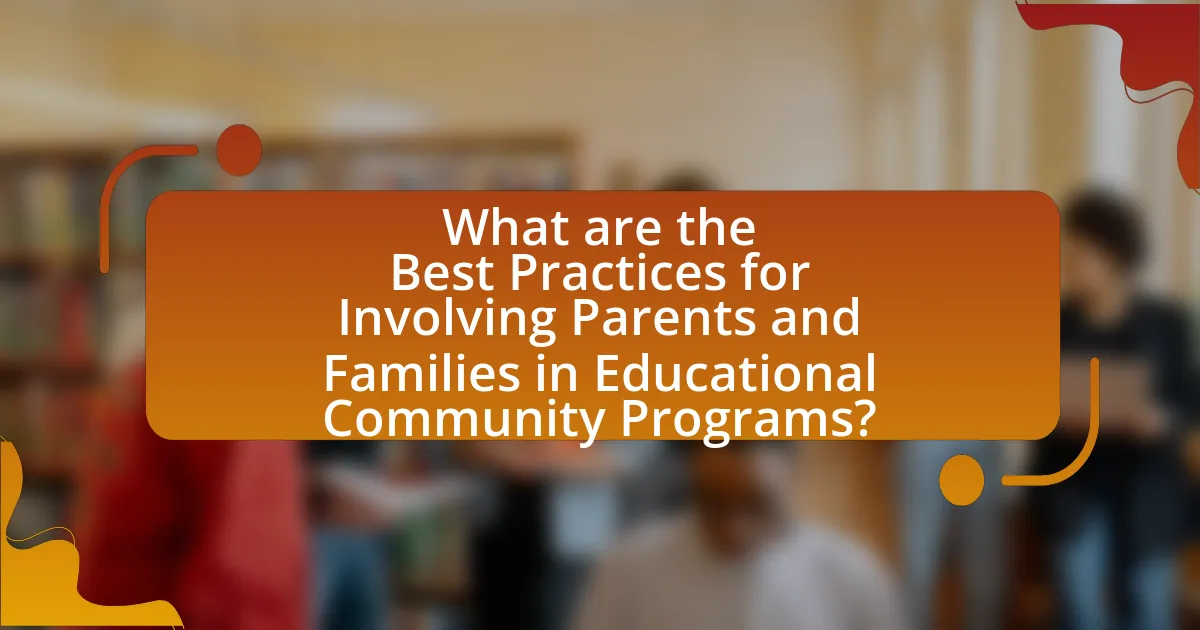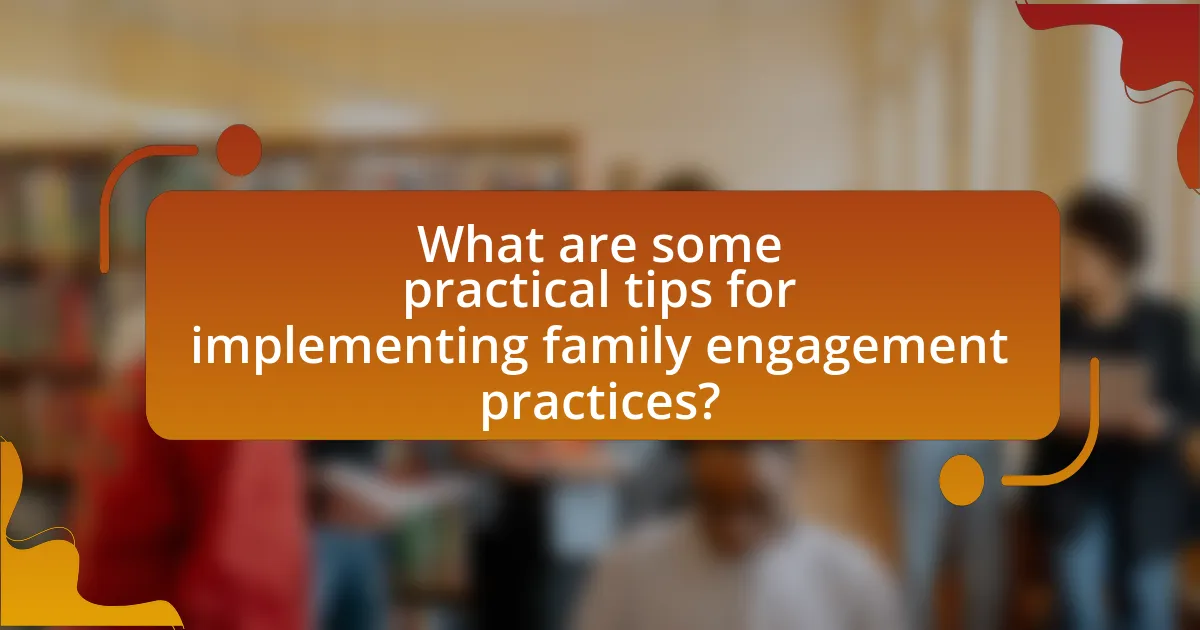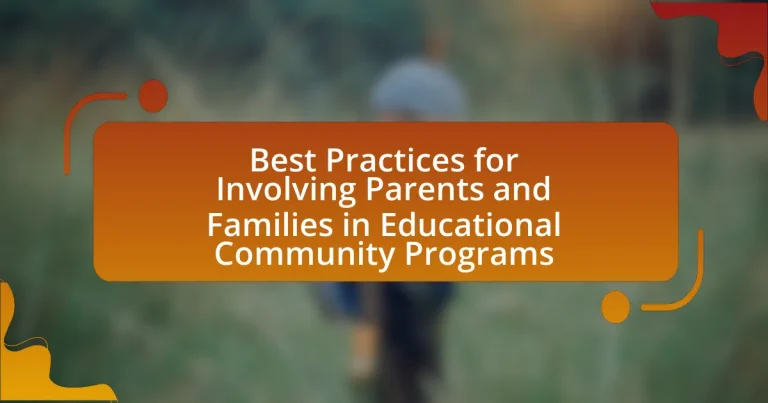The article focuses on best practices for involving parents and families in educational community programs, emphasizing the importance of clear communication, a welcoming environment, and opportunities for active participation. It outlines the significant impact of parental involvement on student achievement, motivation, and overall educational outcomes. Strategies for enhancing engagement, addressing barriers, and measuring effectiveness are discussed, alongside the role of community support and resources available to families. The article also highlights common misconceptions and pitfalls in family engagement efforts, providing practical tips for schools to foster meaningful partnerships with families.

What are the Best Practices for Involving Parents and Families in Educational Community Programs?
The best practices for involving parents and families in educational community programs include establishing clear communication channels, fostering a welcoming environment, and providing opportunities for active participation. Clear communication ensures that parents are informed about program goals, schedules, and their roles, which can be achieved through newsletters, meetings, and digital platforms. Creating a welcoming environment encourages families to engage by making them feel valued and respected, which can be facilitated through inclusive events and culturally relevant activities. Additionally, offering diverse opportunities for participation, such as volunteering, attending workshops, or joining advisory committees, empowers families to contribute meaningfully to the educational community. Research indicates that schools with strong family engagement see improved student outcomes, highlighting the importance of these practices.
Why is parental involvement important in educational community programs?
Parental involvement is crucial in educational community programs because it enhances student achievement and fosters a supportive learning environment. Research indicates that students whose parents are actively engaged in their education tend to have higher grades, better attendance, and increased motivation. For instance, a study by the National Center for Family & Community Connections with Schools found that effective parental involvement can lead to a 10-20% increase in student performance. This involvement also strengthens the relationship between families and schools, creating a collaborative atmosphere that benefits both students and educators.
How does parental involvement impact student success?
Parental involvement significantly enhances student success by improving academic performance, increasing motivation, and fostering positive attitudes toward education. Research indicates that students with engaged parents are more likely to achieve higher grades, complete homework, and have better attendance records. A study by the National Center for Family & Community Connections with Schools found that students whose parents are involved in their education are 30% more likely to earn higher grades and test scores. Additionally, parental involvement contributes to the development of social skills and emotional well-being, which are crucial for overall academic success.
What role do families play in shaping educational outcomes?
Families play a crucial role in shaping educational outcomes by influencing children’s attitudes toward learning and providing support for academic achievement. Research indicates that parental involvement, such as engaging in school activities and fostering a positive learning environment at home, significantly enhances students’ performance. For instance, a study published in the “Journal of Educational Psychology” found that students with involved parents had higher grades and better attendance rates compared to those with less engaged families. This demonstrates that active participation from families directly correlates with improved educational results.
What strategies can be employed to enhance parental engagement?
To enhance parental engagement, schools can implement strategies such as regular communication, inclusive events, and collaborative decision-making. Regular communication through newsletters, emails, and parent-teacher conferences keeps parents informed about their child’s progress and school activities, fostering a sense of involvement. Inclusive events, such as workshops and family nights, encourage parents to participate in the school community, creating opportunities for relationship-building. Collaborative decision-making, where parents are invited to contribute to school policies and programs, empowers them and strengthens their commitment to the educational process. Research indicates that schools with strong parental engagement see improved student outcomes, highlighting the effectiveness of these strategies.
How can schools effectively communicate with parents?
Schools can effectively communicate with parents by utilizing multiple channels such as newsletters, emails, phone calls, and parent-teacher conferences. These methods ensure that information is disseminated in a timely manner and allows for two-way communication, fostering engagement. Research indicates that schools that implement regular communication strategies see increased parental involvement, which positively impacts student achievement. For instance, a study by the Harvard Family Research Project found that effective communication between schools and families leads to higher student performance and better school attendance.
What types of events can encourage family participation?
Family participation can be encouraged through events such as family nights, workshops, and community service projects. Family nights provide opportunities for families to engage in fun activities together, fostering a sense of community and belonging. Workshops can educate families on relevant topics, enhancing their skills and knowledge, which can lead to increased involvement in educational programs. Community service projects allow families to work together towards a common goal, strengthening their bonds while contributing positively to the community. Research indicates that when families are actively involved in educational settings, student achievement and engagement improve significantly, highlighting the importance of these events in promoting family participation.
What challenges do schools face in involving parents and families?
Schools face several challenges in involving parents and families, primarily due to communication barriers, differing cultural expectations, and time constraints. Communication barriers arise when schools fail to provide information in languages or formats accessible to all families, leading to misunderstandings and disengagement. Differing cultural expectations can create gaps in understanding the role of parents in education, as some families may not be familiar with the school system or its expectations. Time constraints often prevent parents from participating in school activities, as many juggle work and family responsibilities, limiting their availability for meetings or events. These challenges hinder effective collaboration between schools and families, impacting student success and community engagement.
How can schools address barriers to parental involvement?
Schools can address barriers to parental involvement by implementing flexible communication strategies and providing resources that accommodate diverse family needs. For instance, schools can utilize multiple communication channels, such as phone calls, emails, and text messages, to ensure that all parents receive important information in a format that works for them. Additionally, offering workshops and resources in multiple languages can help non-English speaking parents engage more effectively. Research indicates that schools with strong family engagement practices see improved student outcomes, as highlighted in the study “A New Wave of Evidence: The Impact of School, Family, and Community Connections on Student Achievement” by the Southwest Educational Development Laboratory, which emphasizes the correlation between parental involvement and academic success.
What misconceptions about parental involvement need to be addressed?
Misconceptions about parental involvement that need to be addressed include the belief that only highly educated parents can effectively contribute to their children’s education. This notion undermines the potential impact of all parents, regardless of their educational background. Research indicates that parental involvement, such as attending school events or helping with homework, positively influences student achievement across diverse demographics (Henderson & Mapp, 2002). Another misconception is that parental involvement is solely the responsibility of the parents, ignoring the role of schools in fostering partnerships. Effective collaboration between schools and families is essential for maximizing student success, as highlighted in the National PTA’s “National Standards for Family-School Partnerships.” Addressing these misconceptions can lead to more inclusive and effective strategies for engaging all families in educational programs.
How can schools measure the effectiveness of their engagement strategies?
Schools can measure the effectiveness of their engagement strategies by utilizing surveys, attendance records, and academic performance metrics. Surveys can gather feedback from parents and students regarding their satisfaction and involvement, providing quantitative and qualitative data on engagement levels. Attendance records can indicate participation in school events and meetings, reflecting the community’s interest and involvement. Academic performance metrics, such as grades and test scores, can be analyzed to assess whether increased engagement correlates with improved student outcomes. Research shows that schools with higher parental involvement often see better student performance, as indicated by a study published in the “Review of Educational Research,” which found a positive relationship between family engagement and student achievement.
What metrics can be used to assess parental involvement?
Metrics that can be used to assess parental involvement include attendance at school events, frequency of communication between parents and teachers, and participation in parent-teacher conferences. Attendance at school events, such as open houses and workshops, provides a quantitative measure of parental engagement. The frequency of communication, which can be tracked through emails, phone calls, and messages, indicates the level of interaction between parents and educators. Participation in parent-teacher conferences serves as a direct metric of parents’ commitment to their child’s education. These metrics are supported by research indicating that higher levels of parental involvement correlate with improved student outcomes, such as academic performance and social skills.
How can feedback from parents improve engagement practices?
Feedback from parents can significantly enhance engagement practices by providing insights into their children’s needs and preferences. When parents share their perspectives, educators can tailor programs and communication strategies to better align with family expectations and cultural contexts. Research indicates that schools that actively seek and incorporate parental feedback see increased student participation and satisfaction, as evidenced by a study from the Harvard Family Research Project, which found that effective family engagement leads to improved academic outcomes. By integrating this feedback, educational institutions can foster a more inclusive environment that promotes collaboration between families and schools, ultimately enhancing the overall educational experience.

What are the key components of successful family engagement initiatives?
Successful family engagement initiatives include effective communication, collaboration, and support systems. Effective communication ensures that families receive timely and relevant information about their children’s education, fostering a partnership between educators and families. Collaboration involves actively involving families in decision-making processes and school activities, which enhances their investment in the educational community. Support systems, such as resources and training for families, empower them to engage meaningfully in their children’s learning. Research indicates that schools with strong family engagement see improved student outcomes, highlighting the importance of these components in creating successful initiatives.
How can schools build strong partnerships with families?
Schools can build strong partnerships with families by implementing regular communication strategies that foster engagement and collaboration. Effective communication includes newsletters, parent-teacher conferences, and digital platforms that keep families informed about school activities and their children’s progress. Research indicates that schools with strong family engagement see improved student outcomes; for instance, a study by the Harvard Family Research Project found that students whose families are involved in their education have higher grades and better attendance. Additionally, schools can create opportunities for families to participate in decision-making processes, such as forming advisory committees or hosting workshops, which further strengthens the partnership and ensures that families feel valued and heard.
What are the best practices for creating a welcoming environment for families?
Creating a welcoming environment for families involves fostering open communication, providing accessible resources, and ensuring inclusivity. Open communication can be established through regular updates and feedback opportunities, which help families feel informed and valued. Accessible resources, such as multilingual materials and family support services, ensure that all families can engage meaningfully. Inclusivity can be promoted by celebrating diverse cultures and backgrounds within the community, which enhances the sense of belonging. Research indicates that schools with strong family engagement practices see improved student outcomes, highlighting the importance of these best practices in educational settings.
How can schools involve families in decision-making processes?
Schools can involve families in decision-making processes by establishing structured communication channels, such as regular meetings, surveys, and advisory committees. These methods allow parents to express their opinions and contribute to discussions regarding school policies and programs. Research indicates that schools that actively engage families in decision-making see improved student outcomes and increased parental satisfaction. For instance, a study by the Harvard Family Research Project found that schools with strong family engagement practices reported higher levels of student achievement and better school climate.
What role does community support play in family engagement?
Community support significantly enhances family engagement by providing resources, fostering relationships, and creating a sense of belonging. When communities actively support families, they facilitate access to educational programs, workshops, and events that encourage parental involvement. Research indicates that schools with strong community ties see higher levels of family participation, which correlates with improved student outcomes. For instance, a study by the Harvard Family Research Project found that community engagement initiatives lead to increased parental involvement, resulting in better academic performance and social skills among children. This evidence underscores the critical role community support plays in promoting effective family engagement in educational settings.
How can local organizations collaborate with schools to support families?
Local organizations can collaborate with schools to support families by establishing partnerships that provide resources, services, and programs tailored to family needs. For instance, organizations can offer workshops on parenting skills, financial literacy, and health education, which directly benefit families and enhance student success. Research indicates that schools with strong community partnerships see improved student attendance and academic performance, as evidenced by a study from the National Education Association, which found that family engagement initiatives lead to a 20% increase in student achievement. Additionally, local organizations can facilitate access to social services, such as counseling and food assistance, ensuring families have the support necessary for their children’s educational success.
What resources are available to assist families in educational programs?
Families can access various resources to assist them in educational programs, including community organizations, online platforms, and government initiatives. Community organizations often provide workshops, tutoring services, and family engagement events that foster parental involvement in education. Online platforms, such as educational websites and forums, offer resources like lesson plans, parenting tips, and access to virtual learning tools. Government initiatives, such as Title I funding, support schools in providing additional resources for low-income families, ensuring they have access to necessary educational materials and programs. These resources collectively enhance family engagement and support children’s educational success.

What are some practical tips for implementing family engagement practices?
To implement family engagement practices effectively, schools should establish clear communication channels with families. Regular updates through newsletters, emails, and social media can keep families informed about school events and their children’s progress. Research indicates that schools with strong family engagement see improved student outcomes; for instance, a study by the Harvard Family Research Project found that effective family engagement can lead to higher student achievement and better attendance rates. Additionally, schools should create opportunities for families to participate in decision-making processes, such as forming advisory committees or hosting workshops, which fosters a sense of ownership and collaboration.
How can educators effectively involve parents in their child’s learning?
Educators can effectively involve parents in their child’s learning by establishing regular communication channels, such as newsletters, emails, and parent-teacher conferences. This consistent engagement allows parents to stay informed about their child’s progress and school activities. Research indicates that when schools maintain strong communication with families, student achievement improves; for instance, a study by the Harvard Family Research Project found that students whose parents are involved in their education have higher grades and test scores. Additionally, educators can create opportunities for parents to participate in school events and volunteer activities, fostering a sense of community and collaboration that enhances the learning environment.
What are some simple activities parents can do at home to support learning?
Parents can support learning at home by engaging in activities such as reading together, practicing math through everyday tasks, and encouraging creative play. Reading together enhances vocabulary and comprehension skills, as studies show that children who are read to regularly perform better academically. Practicing math through cooking or budgeting helps children apply mathematical concepts in real-life situations, reinforcing their understanding. Encouraging creative play, such as building with blocks or drawing, fosters critical thinking and problem-solving skills, which are essential for academic success. These activities not only support learning but also strengthen the parent-child bond, creating a positive learning environment at home.
How can schools provide training for parents to enhance their involvement?
Schools can provide training for parents to enhance their involvement by implementing workshops and informational sessions focused on effective parenting strategies and engagement techniques. These workshops can cover topics such as understanding the curriculum, supporting homework, and fostering communication between parents and teachers. Research indicates that schools that actively engage parents through structured training programs see improved student outcomes, as evidenced by a study published in the “Journal of Educational Psychology,” which found that parental involvement positively correlates with academic success. By offering these resources, schools empower parents to take an active role in their children’s education, thereby strengthening the educational community.
What are common pitfalls to avoid in family engagement efforts?
Common pitfalls to avoid in family engagement efforts include lack of clear communication, insufficient understanding of family needs, and failure to build trust. Clear communication is essential; without it, families may feel excluded or misinformed about programs. Research indicates that when schools do not actively seek to understand the diverse needs of families, engagement efforts can falter, leading to lower participation rates. Additionally, trust is foundational; if families perceive that their input is not valued or that the school is not transparent, they are less likely to engage. Studies show that trust-building activities, such as regular feedback loops and inclusive decision-making processes, significantly enhance family involvement in educational programs.
How can schools ensure they are not alienating families?
Schools can ensure they are not alienating families by actively engaging them in the educational process through regular communication and inclusive practices. Establishing consistent channels for feedback, such as surveys and meetings, allows families to voice their concerns and suggestions, fostering a sense of belonging. Research indicates that schools with strong family engagement programs see improved student outcomes, as highlighted in the study “A New Wave of Evidence: The Impact of School, Family, and Community Connections on Student Achievement” by the Southwest Educational Development Laboratory, which found that effective family involvement leads to higher academic performance and better behavior in students. By prioritizing transparency and collaboration, schools can create an environment where families feel valued and included.
What strategies can prevent burnout among staff working on family engagement?
To prevent burnout among staff working on family engagement, implementing regular training and professional development opportunities is essential. These initiatives equip staff with effective strategies for managing their workload and enhancing their skills, which can lead to increased job satisfaction. Research indicates that organizations providing ongoing training report lower turnover rates and higher employee morale, as staff feel more competent and supported in their roles. Additionally, fostering a supportive work environment through team-building activities and open communication can significantly reduce feelings of isolation and stress, further mitigating burnout.
What are the long-term benefits of effective family engagement in education?
Effective family engagement in education leads to improved student academic performance, enhanced social skills, and increased graduation rates. Research indicates that students whose families are actively involved in their education tend to achieve higher grades and test scores, with a study by the Harvard Family Research Project showing that family engagement can lead to a 30% increase in student achievement. Additionally, effective engagement fosters better communication between families and schools, creating a supportive environment that encourages student persistence and success. This collaborative approach not only benefits students academically but also contributes to their emotional well-being and social development, as families become partners in the educational process.
How does sustained parental involvement influence school culture?
Sustained parental involvement significantly enhances school culture by fostering a collaborative environment that promotes student achievement and well-being. When parents actively engage in school activities, they contribute to a sense of community, which can lead to improved student morale and motivation. Research indicates that schools with high levels of parental involvement often experience better academic performance, lower dropout rates, and increased student attendance. For instance, a study by the Harvard Family Research Project found that students whose parents are involved in their education are more likely to earn higher grades and test scores, demonstrating the positive correlation between parental engagement and school culture.
What impact does family engagement have on community relationships?
Family engagement significantly enhances community relationships by fostering collaboration and trust among families, schools, and local organizations. When families actively participate in educational programs, they contribute to a shared sense of responsibility and investment in the community’s well-being. Research indicates that schools with strong family engagement see improved student outcomes, which in turn strengthens community ties. For instance, a study by the Harvard Family Research Project found that effective family engagement leads to higher levels of parental involvement, which correlates with increased student achievement and a more cohesive community environment. This collaborative dynamic not only benefits students but also cultivates a supportive network that enhances overall community resilience and cohesion.


